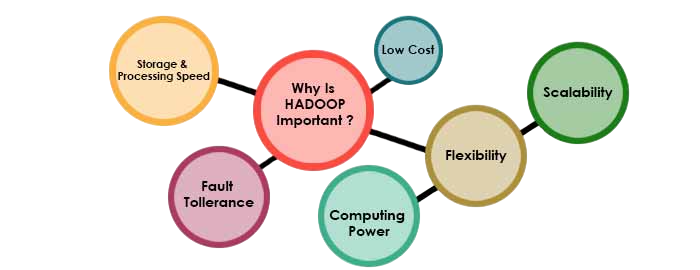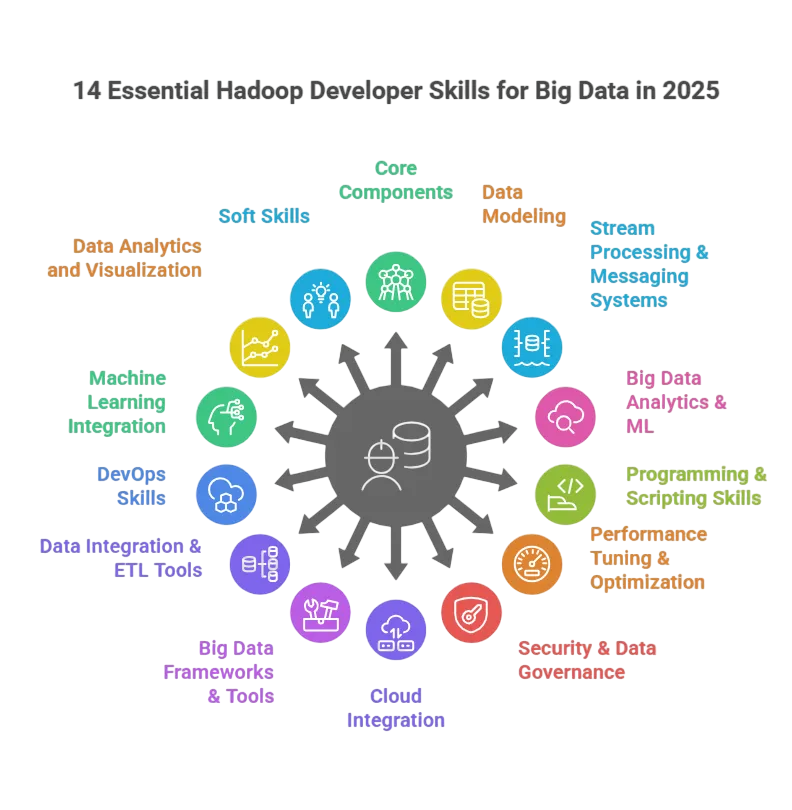
- Introduction: Why Big Data and Hadoop?
- What is Hadoop and Why is it So Important?
- The Rising Demand for Big Data Hadoop Professionals
- Key Career Roles in the Hadoop Ecosystem
- Essential Skills Required for a Hadoop Career
- Educational Background and Eligibility
- Top Certifications That Boost Your Hadoop Career
- Salary Trends and Growth Potential
- Conclusion: Is a Hadoop Career Right for You?
Introduction: Why Big Data and Hadoop?
In the digital age, data is growing faster than ever before. With smartphones, IoT devices, social media platforms, and cloud computing, we generate trillions of bytes of data every second. In today’s data-driven world, pursuing a Hadoop career path offers tremendous opportunities across industries such as finance, healthcare, and e-commerce. However, traditional data management systems are unable to process this enormous volume, variety, and velocity of data. That’s where Big Data technologies like Hadoop come into play and enrolling in a Data Science course can help you understand how to use them effectively to solve real-world data challenges. Choosing a career in Big Data, specifically Hadoop, isn’t just a smart move it’s a future-proof investment. Companies across industries are desperately looking for skilled professionals who can manage, process, and analyze huge datasets. Hadoop has emerged as the backbone of many Big Data projects, making it an essential skill set in today’s job market. By following a well-defined Hadoop career path, you can unlock high salary potential and build a future-proof career in the rapidly growing Big Data landscape.
What is Hadoop and Why is it So Important?
Apache Hadoop is an open-source framework designed for distributed storage and processing of large datasets across clusters of computers. It is capable of handling both structured and unstructured data with scalability, fault tolerance, and efficiency.

Core Components of Hadoop:
- HDFS (Hadoop Distributed File System) is used for storing large files across multiple machines understanding concepts like this highlightsHDFS (Hadoop Distributed File System) is used for storing large files across multiple machines understanding concepts like this highlights Why Scala Training is Important, especially when working with big data tools like Hadoop and Spark, especially when working with big data tools like Hadoop and Spark.
- MapReduce : A processing model for parallel computation on large data sets.
- YARN (Yet Another Resource Negotiator): Manages resources in a Hadoop cluster.
- Hadoop Common: Shared utilities and libraries required by other Hadoop modules.
- Store huge volumes of data cost-effectively.
- Perform complex data analysis using commodity hardware.
- Scale their systems as data grows.
- Gain insights that drive business decisions.
Hadoop is important because it allows organizations to:
Its ability to handle large-scale data processing in real time makes Hadoop central to Big Data strategies worldwide.
Do You Want to Learn More About Data Science? Get Info From Our Data Science Course Training Today!
The Rising Demand for Big Data Hadoop Professionals
As businesses become more data-centric, the need for Big Data professionals especially those proficient in Hadoop has surged. The demand for skilled professionals in Big Data is booming, with numerous Hadoop jobs available across various industries like healthcare, finance, and retail. These Hadoop jobs offer lucrative salaries and growth opportunities for those proficient in managing and analyzing large datasets using Hadoop technologies. According to industry reports, the global Big Data market is expected to exceed 250 billion by 2026, with Hadoop playing a critical role in data storage and processing strategies a trend also reflected in the growing use of Big Data in Real Estate for smarter decision-making and predictive analytics.
Enterprises from sectors such as banking, retail, healthcare, telecommunications, and e-commerce are actively recruiting Hadoop professionals to:
- Analyze consumer behavior.
- Optimize operations and logistics.
- Enhance fraud detection systems.
- Improve customer experience through personalization.
- Programming Languages : Java (for MapReduce), Python, or Scala.
- SQL Knowledge : For querying data using Hive or Impala.
- Big Data Tools : Hive, Pig, HBase, Flume, Sqoop, Oozie.
- Apache Spark : Often integrated with Hadoop for faster processing.
- Linux : Many Hadoop systems are deployed on Linux servers. Conceptual Skills:
- Understanding of Distributed Systems and Parallel Processing.
- Familiarity with ETL (Extract, Transform, Load) pipelines.
- Basics of Data Warehousing and Data Modeling.
- Computer Science / IT Graduates
- Software Developers or QA Testers
- Data Analysts or BI Professionals
- System Administrators
- Statisticians and Mathematicians
- Cloudera Certified Associate (CCA) Spark and Hadoop Developer
- Hortonworks HDP Certified Developer / Administrator
- MapR Certified Hadoop Developer
- IBM Big Data Engineer Professional Certificate
- Microsoft Azure Data Engineer Associate
- AWS Certified Big Data Specialty
Job portals like LinkedIn, Glassdoor, and Indeed list thousands of openings for roles like Hadoop Developer, Big Data Engineer, Data Analyst, and Hadoop Administrator, highlighting the unprecedented demand and career potential in this space.
Would You Like to Know More About Data Science? Sign Up For Our Data Science Course Training Now!
Key Career Roles in the Hadoop Ecosystem
With a wide variety of job options to fit varying interests and skill levels, the Hadoop ecosystem is extensive. Exciting career options can be unlocked with a solid foundation in data science and familiarity with Big Data platforms like Hadoop. Big Data Engineers, who create large-scale data pipelines and integrate Hadoop with other technologies to ensure smooth data flow; Hadoop Developers, who create and manage Hadoop applications using tools like MapReduce, Hive, Pig, and Spark; Hadoop Administrators, who manage clusters, configure nodes, ensure security, and maintain system health;Data scientists integrate Hadoop into a larger toolkit for machine learning and predictive analytics on enormous data sets, while data analysts employ Hadoop technologies to clean, analyse, and interpret large datasets for business insights. Although each of these positions has a unique set of difficulties and learning curves, they are all centred on applying Hadoop-powered data solutions to solve practical issues highlighting Why Scala Training is Important for professionals working with tools like Apache Spark within the Hadoop ecosystem.
Essential Skills Required for a Hadoop Career
A successful career in Hadoop requires a blend of programming, data processing, and system management skills. Professionals skilled in data science are in high demand as companies seek to improve decision-making, and mastering tools within the Hadoop ecosystem is key to excelling in the competitive field of data science and a well structured Data Science course can guide you through that journey step by step.

By mastering these skills, you can position yourself as a well-rounded Hadoop professional ready to tackle enterprise-scale data problems.
Gain Your Master’s Certification in Data Science Training by Enrolling in Our Big Data Analytics Master Program Training Course Now!
Educational Background and Eligibility
One of the advantages of a career in Big Data Hadoop is its accessibility to a wide range of professionals. While a degree in computer science, engineering, or mathematics is helpful, it is not mandatory.
Ideal Backgrounds:Even non-technical professionals can break into the field with the right training and mindset especially today, when Enterprises Need Big Data Experts more than ever to drive data-driven decision-making. Many professionals switch to Big Data after attending bootcamps, certification programs, or online courses that focus on Hadoop and its ecosystem.
Preparing for Data Science Job? Have a Look at Our Blog on Data Science Interview Questions & Answer To Acte Your Interview!
Top Certifications That Boost Your Hadoop Career
Certifications validate your skills and make your resume stand out. Here are some top certifications recognized in the Big Data industry:
These certifications are often performance-based and simulate real-world tasks, giving you both credibility and confidence especially if you’re Switching Career from Java to Hadoop , as they validate your skills in a new domain.
Salary Trends and Growth Potential
Big Data Hadoop professionals command some of the highest salaries in the IT industry due to the specialized nature of their work and the shortage of skilled talent. Because of the specialised skills needed and the lack of skilled talent, Big Data Hadoop professionals are among the highest-paid specialists in the IT sector. Depending on expertise and job profile, these positions in India usually pay between ₹6 lakhs and ₹25 lakhs annually. For example, Hadoop developers often make between ₹7 and ₹15 lakhs, but big data engineers can anticipate making at least ₹10 to ₹20 lakhs. Data analysts with Hadoop expertise typically make between ₹5 and ₹10 lakhs a year, while Hadoop administrators typically make between ₹6 and ₹12 lakhs. Data scientists with machine learning and Hadoop experience command the highest packages, which often range from ₹15 to ₹25 lakhs. Furthermore, there are many opportunities for remote work and freelancing in this industry, which offer even more flexibility and financial potential.
Conclusion: Is a Hadoop Career Right for You?
A career in Big Data Hadoop is not just a job it’s a journey into the heart of digital transformation. Every industry today is seeking insights from data, and Hadoop remains one of the most powerful engines for making this possible. Whether you’re a fresh graduate, a working professional looking to switch careers, or a tech enthusiast exploring emerging domains, a Data Science course can be your gateway to Hadoop offering opportunities for growth, innovation, and high earning potential. The learning curve can be steep, but the rewards are significant. With the right training, certifications, and project experience, you can become a key player in an industry that thrives on data-driven intelligence.


